|
TRANSLATE THIS ARTICLE
Integral World: Exploring Theories of Everything
An independent forum for a critical discussion of the integral philosophy of Ken Wilber
 Ray Harris is a frequent contributor to this website. He has written articles on 9/11, boomeritis, the Iraq war and Third Way politics. Since 2007 he took to writing his novels Navaratri, Wild Child and Eden. Harris lives in Ballarat, Victoria, Australia. Ray Harris is a frequent contributor to this website. He has written articles on 9/11, boomeritis, the Iraq war and Third Way politics. Since 2007 he took to writing his novels Navaratri, Wild Child and Eden. Harris lives in Ballarat, Victoria, Australia.
Integral GeopoliticsPart 2: International Relations TheoryRay HarrisGreat powers recognize that the best way to ensure their security is to achieve hegemony now, thus eliminating any possibility of a challenge by another great power. Only a misguided state would pass up an opportunity to be the hegemon in the system because it thought it already had sufficient power to survive. It is a moral issue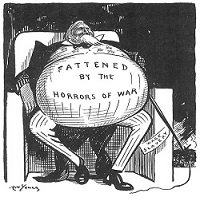
Remember the outrage over the Iraq war? The lies about weapons of mass destruction. Hundreds of thousands of innocent Iraqis killed. Imperialist Neocon foreign policy. Profiteering by Cheney and Halliburton. Blair and Bush. The treatment of prisoners at Abu Ghraib and Guantanamo Bay. The War on Terror. War unleashes monsters and atrocities. Humanity at its worst.
Of course it is a moral issue. A fundamental moral issue. If we are going to look at war and global geopolitics from an integral perspective we have to address moral reasoning. Because of this I will lean heavily on Kohlberg's model, which remains robust. 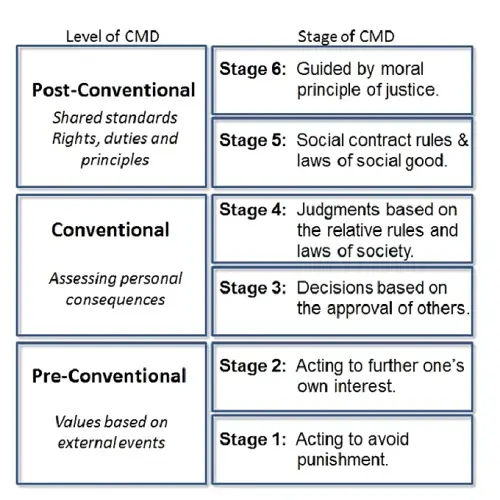
Cognitive Moral Development. Levels and Stages of CMD (Based on description from Kohlberg, 1976).
It seems immediately obvious that the various schools of thought in international relations reflect Kohlberg's stages. But first an important clarification. Nations are not subjects. They are abstract collectives consisting of individuals at all levels of development. So we cannot say that this or that country is pre-conventional or conventional. We can however say that leaders and political parties express particular values. Populists of all stripes appeal to pre-conventional self-interest. The blatant example is Trump's 'Make America Great Again', but he is not the only example of populist appeals to national, religious or ethnic exceptionalism. It is also important to remember that people/groups change stages depending on the circumstances. Anyone who is under immediate threat of violence will revert to pre-conventional. The battlefield is fear based flight or fight, the body pumping with adrenaline and cortisol leaving little space for rational responses. That's why there are always reports of atrocities committed by both sides. Rage and revenge. And finally a note about self-diagnosis, a Kohlbergian Dunning-Kruger effect. People tend to think they are operating at a higher stage of moral reasoning than they are. Kohlberg had difficulty finding people who operated consistently at stage 6, so it is rare. A good measure is universality. If the person is applying a different moral standard to the actors depending on some undeclared preference, they are hardly acting from a post-conventional stage. The most obvious example is highlighting the foreign policy sins of the US whilst ignoring the sins of Russia. Post-conventional sees universal principles, it is not partisan. The Four Schools of International Relations1. RealismWhy, when there are clearly distinct schools of international relations and dozens of equally expert opinions, have some in the integral movement chosen John Mearsheimer above others? Surely an 'integral' approach must consider all qualified opinions? I'm going to be blunt. The reason is that they believe Mearsheimer is confirming what they have already decided is the case. It is NATO's fault, and therefore, by association, America's fault. Except of course, a close reading of Mearsheimer doesn't actually support the 'it's NATO's fault' rationalisation. I'll return to that point a little later, but first an overview of IRT. There are four broad positions: the realist or neorealist, the liberal/neoliberal (or idealist), Marxist and constructivist. There are variations in all four. The realist position is split between the defensive and offensive schools. Mearsheimer defined the offensive position in a challenge to the defensive school of Charles Glaser. In this video each discusses their position.
International Relations & Politics - Realism | Offensive and Defensive Realism with John Mearsheimer
The realist school follows the pessimism of Thucydides, Machiavelli and Hobbes. It assumes the worst in human behaviour and defines IR primarily in terms of power. The four foundational principles of realism are:
It ought to be clear from this that realism operates at the level of pre-conventional stage 1 and 2. Nations build defence systems to avoid being punished by real or imagined enemies and they use what power they have to pursue their self-interest. Using the realist justification, Mearsheimer has argued that the prospect of Ukraine joining NATO threatened Russia's security. The realists call this the 'security dilemma', where the actions of one state to improve its security threatens the security of neighbouring states. Misreading RealismCritical to Mearsheimer's offensive realism is the concept of the regional hegemon, a state so powerful that it controls the states around it. But here is the thing. Realism does not favour one hegemon over another. There is no good versus bad hegemon. Mearsheimer downplays the impact of values and morality. States are black boxes, the internal workings invisible. NATO, the hegemonic power in Europe, is as equally justified in pursuing its self-interest as is Russia. Similarly, realist logic suggests the US is also entitled to pursue its hegemonic self-interest. The best that can be hoped for is a balance of power between competing hegemons. But because of the security dilemma, this balance of power is inherently unstable. Despite this rather obvious characteristic of realism, some people in the integral community have clearly decided that NATO, and especially the US, are the bad guys. They have determined that the US's pursuit of power is immoral. This is a value judgment that comes from outside realist theory. 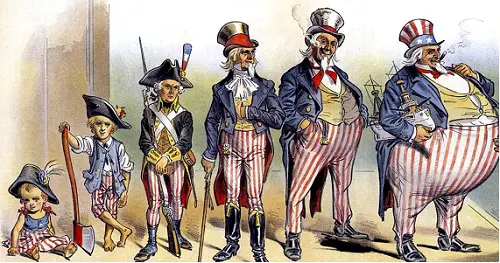
'A lesson for anti-expansionists.'
I would suggest that the reason for this is a sense of deep betrayal and anger; of the US somehow not living up to its promise. 2. The Liberal OrderThe inherent anarchy of the world order suggests the need for organised cooperation or some form of transnational law and order. After the horror of WW1, a first attempt at such a transnational organisation was the League of Nations. After WW2 this evolved not only into the United Nations, but a whole range of sibling organisations and agreements covering trade, international justice, scientific and cultural exchange and emergency relief. The general aim of these organisations was to promote democracy, free trade and human rights. The rules based international order. This is analogous to the conventional stage of moral reasoning. States would be expected to obey a set of agreed international laws and conventions. Failure to do so would incur disapproval or some form of punitive sanctions. As with the realist school, the liberal school has further divided into two: classical liberalism and neoliberalism. Neoliberalism introduces the idea of complex interdependence. States do not act alone, rather they act in coordination with non-state actors such as NGOs, multinational corporations and other transnational entities. At this point is necessary to highlight a common misconception. Neoliberal IR is not the same as neoliberal economic theory. International cooperation is not predicated on the economic policy of any given state. We can see this at play in the current UN with social democratic countries such as Norway sitting alongside the mixed economy of India and the command economy of China. Despite this, some people seem to think the 'liberal world order' means imposing neoliberal economics.
Noah Zerbe - Neoliberalism and Complex Interdependence
Nor does any of the above ignore the inefficiencies and structural problems of the liberal rules based order. There are a number of prominent issues that are widely discussed, all of which suggest reform rather than disestablishment.
3. Workers of the world unite—Marxism and NeomarxismMarxism was the first truly global political movement. Nation states were seen as part of the bourgeois, capitalist order. Wars were fought between competing bourgeois interests using the proletariat as cannon fodder. Through the emancipation of private property from the community, the State has become a separate entity, beside and outside civil society; but it is nothing more than the form of organisation which the bourgeois necessarily adopt both for internal and external purposes, for the mutual guarantee of their property and interests. (1)
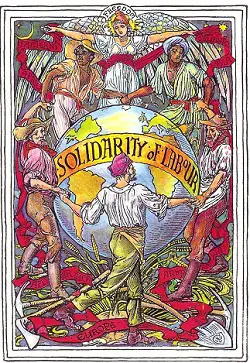 Walter Crane 'Solidarity of Labour' This bourgeois state was supposed to disappear as a result of the proletarian revolution, leading to new forms of regional and ethnic organisations—the 'soviets'. This idea was further developed by none other than Joseph Stalin in 'Marxism and The National Question' (1913) But this is not the case with an organization on the basis of nationalities. When the workers are organized according to nationality they isolate themselves within their national shells, fenced off from each other by organizational barriers. The stress is laid not on what is common to the workers but on what distinguishes them from each other. In this type of organization the worker is primarily a member of his nation: a Jew, a Pole, and so on. It is not surprising that national federalism in organization inculcates in the workers a spirit of national seclusion. Therefore, the national type of organization is a school of national narrow-mindedness and stagnation. Thus, the principle of international solidarity of the workers is an essential element in the solution of the national question. (2) At least, that was the ideal. And whilst it certainly didn't work out that way, as an ideal I would argue it meets the criterion of Kohlberg's stage 5—the first post-conventional stage. A controversial call? Remember, stage 5 is about what makes a good society. In this case injustice is caused by the class structure of society, necessitating the restructuring of society altogether. Stage 4 is about obedience to the formal laws as given. I would add a further note that Marxism is a developmental system that involves the transformation of society and of individuals. The national/international question would continue to challenge Marxist theory. The failure of the proletarian revolution and the continued success of the bourgeois liberal order lead to new formulations. Here I want to mention one in particular. The concept of Empire as developed by Hardt and Negri. (3) Many divisions, such as inside/outside and other/self, defined modern imperialism. This was largely because modern imperialism concerned itself so greatly with territories and boundaries. In Empire, boundaries have become increasingly meaningless to its diffuse and global network. There is no longer an "outside" of Empire because everything is contained within it (4) We are by no means opposed to the globalization of relationships as such—in fact, as we said, the strongest forces of Leftist internationalism have effectively led this process. The enemy, rather, is a specific regime of global relations that we call Empire. (5) Marxism was an aggressive and intentionally violent challenge to the bourgeois state. It inspired revolutions in Russia, China and Cuba, insurgencies and civil wars in SE Asia, South America and Africa, many supported by the new communist states of Russia and China (which did not always get along). The Korean War was a direct conflict between the Russian controlled north and a nationalist south that wanted to join the new post-war liberal order. Marxist inspired conflict was responsible for the deaths of millions and was a major source of global instability—the Cold War. The question of right or wrong depends entirely on which side you support—although there are Marxists who reject violence, instead advocating change through peaceful reform. The collapse of the Soviet Union ended the Marxist experiment and the new Russia was pulled into the embrace of Empire. A similar process occurred in China as the communist party created corporations and allowed a limited form of market capitalism. It now hosts three of the top 20 global corporations. It has also been absorbed into Empire. The transition to Empire has tended to confuse the traditional Marxist analysis, leading (somewhat unsurprisingly) to factional disagreements over the war in Ukraine. A recent article in Left Voice had this to say: As we pointed out above, part of the Left appeals to the idea of "self-determination” to justify its support for Zelenskyy, while sectors sympathetic to Putin deny it or use it at their discretion. Some foster reformist illusions about their own imperialisms, taking up the old Kautskyist arguments about the supposedly “benevolent” consequences of the interpenetration of capitals. Others nourish hopes in a new world multilateralism headed by the Russia-China axis, recycling “third worldist” tendencies of class conciliation. And there are those who deny any right to self-determination on the grounds that it would be an “undeclared interimperialist war,” thus facilitating the work of the ruling classes—whether pro-NATO or pro-Putin—to manipulate national oppression in favor of their business dealings with the contending powers. (6) An example of the anti-Putin position comes from the Revolutionary Alliance of Labour of Serbia. Using classic Marxist polemic they state: Although the war in Ukraine is part of the general inter-imperialist struggle between NATO countries and Putin's Russia in Eastern Europe, it is at the same time a national liberation war of the Ukrainian people to defend their country and homes from the Great-Russian occupiers. Ukraine is not fighting with the Russian occupiers over some imperialist “sphere of influences” but to defend its own country. Actually, the national liberation war of the Ukrainian people is reducing the danger of the general interimperialist war and is a factor of world peace. To the degree that the Putinist occupiers are driven away from Kiev, to that degree is the world far from the nuclear military catastrophe. We believe that the struggle of the armed Ukrainian people in the liberation war, which stands in the middle of imperialist plans, is a brave and impressive example to all nations of the world in today's historical conditions—that it is possible to resist the imperialist nuclear “superpowers”, which push the world into a new general imperialist war and militaristic catastrophe, and to spoil their vicious plans. (7) 4. ConstructivismAccording to the constructivists, neorealism is reductive. Whilst nations are certainly concerned about security, that is not the only thing they are concerned about. With constructivism we begin to see an attempt at a multi perspective approach. Societies construct narratives that dictate foreign policy. Shocked by their defeat in WW2, the German state has resisted rearming. Same with Japan. Throughout its history the US has seemingly oscillated between imperialist expansion and isolationism. They were notoriously reluctant to enter the European theatre in both WW1 and WW2. The Republican Party has shifted from embracing the neoconservatism of the Bush dynasty to the isolationism of Trump. Constructivist Richard Ned Lebow (8) argues: Following Plato and Aristotle, I posit spirit, appetite and reason as fundamental drives with distinct goals. They generate different logics concerning cooperation, conflict and risk-taking. They require, and help generate, characteristic forms of hierarchy based on different principles of justice. A fourth motive—fear—enters the picture when reason is unable to constrain appetite or spirit. Lebow goes on to explain spirit.
In modern times the spirit (thumos) has largely been ignored by philosophy and social science. I contend it is omnipresent. It gives rise to the universal drive for self-esteem, which finds expression in the quest for honor or standing. By excelling at activities valued by our peer group or society, we win the approbation of those who matter and feel good about ourselves. (9) Lebow claims to have studied every war since 1648, a total of 94. He found that the realist motivation of security only explained 19 of those wars in contrast to 62 motivated by standing or status (9). But status is not the only factor in the constructivist analysis. The founder of constructivism, Alexander Wendt, argues that states develop identities and pursue policies consistent with those identities. These identities can be religious, nationalist, liberal democratic, traditional, pluralist, etc. Another central issue to constructivism is identities and interests. Constructivists argue that states can have multiple identities that are socially constructed through interaction with other actors. Identities are representations of an actor's understanding of who they are, which in turn signals their interests. They are important to constructivists as they argue that identities constitute interests and actions. For example, the identity of a small state implies a set of interests that are different from those implied by the identity of a large state. (10) Where are Kohlberg's stages in all this? Constructivism is multi-level. The narratives that nations and political parties construct can be pre-conventional, conventional, post-conventional or some combination of all three.
Noah Zerbe - Critical Theory - Constructivism
Anti-AmericanismThose are the four recognised schools of international relations. But there is another, informal school of thought—anti-Americanism. An awkward term perhaps, but it will suffice. I want to begin by recounting a bit of Australian history, the Dismissal of the Whitlam government in 1975. I was 20 at the time and I have a clear memory of that day. I heard about it in the offices of Lot's Wife, the Monash University student newspaper. We piled into our cars and headed into the city to join a spontaneous demonstration that ended up as a violent riot outside the Liberal Party HQ. Over time there were other demonstrations, and then rumours began to spread of CIA involvement. The Americans had been concerned about protests over the future of Pine Gap, an important satellite monitoring facility. Fits the narrative doesn't it? Even today there are lists of alleged US coups which include the Dismissal as either an 'attempted' or 'soft' CIA coup. Except it's all nonsense. During that period I was close friends with Jenny Hocking (11). Jenny would go onto become one of Australia's leading historians and an expert on Whitlam (she wrote his two volume biography) and the Dismissal. She took the government to the High Court to release documents concerning the involvement of the Queen in counselling the then Governor General. America and the CIA had no consequential involvement in the events. Yes, they expressed concern over the direction of the Whitlam government. There was chatter. But here's the critical point. Nobody paid any attention. This is not to say that the US hasn't clearly been involved in coups. They have. What it does say is that the US is not behind every plot and scheme. They are not all-powerful. They get manipulated and played as much as they do the manipulating. This exaggerated view of the US as the great puppet master is a consequence of two narratives. The US concept of Manifest Destiny and the Marxist challenge to international capitalism. After WW2, America became the dominant world power. Europe had been exhausted by the war, whereas the US had remained territorially intact. It didn't have to rebuild, so it financed European recovery under the Marshall plan—for a price. 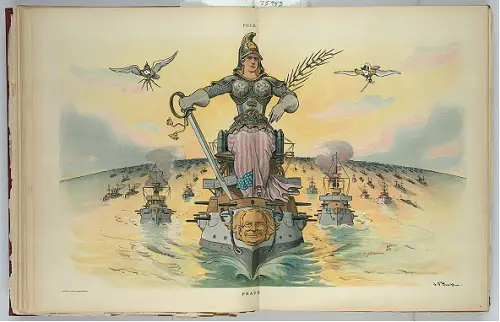
An illustration from 1905 depicting a group of ships with Theodore Roosevelt's face on them and the figure of Peace aboard them sailing across the ocean.
J.S. Pughe/Library of Congress
The doctrine of Manifest Destiny holds that the US has a special role in world history to expand democracy, freedom and prosperity. Generations of American children have been indoctrinated into the exceptionalism narrative. They really believe the US is the best democracy in the world (it's not even in the top 20). The Vietnam war drove a spike into the heart of this optimism. A new generation was exposed to the reality of American power. The American-Spanish war revealed the US as a regional hegemon. But after WW2 it had become a global hegemon: a greedy capitalist, imperialist ogre. It didn't believe in the high principles of liberty at all, it believed in exploitation and profit run by a secretive military industrial complex controlled by the Deep State. The Iraq war reinforced this narrative—a narrative that has morphed into a truly paranoid hybrid now shared by elements of the American far-right and far-left. The liberal world order is a scam. NATO is merely a front. America speaks, everyone jumps. The whole neoliberal system should be overthrown. This is not a view necessarily shared by the rest of the world. It smacks of self-importance. The doctrine of Manifest Destiny is twisted from 'we are the best democracy' to 'we are the best imperialist villain'. Here is the rather passionate view from a group identifying itself as Polish Leftists UK. Your comments come from one place, and one place only—never having been under Russian/Soviet occupation. Never living in what is essentially the shadow of Mordor. Western imperialism, NATO imperialism—those are your main enemies, and we get it. We don't like them either, but for our nations they are the lesser evil. Our enemy is Russian imperialism, and on this front, Eastern European countries choose to stick with NATO, because what comes with Russian imperialism is more than extraction of natural resources and economy, but something much worse. (12) The US as grand puppet master ignores the agency of people around the world, denies the fact that for many being part of the liberal rules based order is the better option. Criticism of Mearsheimer's NeorealismAs I said above, I struggle to understand how anyone who has studied integral theory could support Mearsheimer's reductionism. If they had done their homework they would know his realist view is the minority position in IR. So let's survey some of that criticism. The most direct criticism comes from Robert Keohane and Lisa Martin in 'The Promise of Institutionalist Theory'. However, Professor Mearsheimer's version of realism has some rather serious flaws. Among them are its penchant for assertions that turn out to be incorrect; its propensity to privilege its own viewpoint, so that in the absence of decisive evidence either way it invariably seems to prevail; its failure to explicate the conditions for the operation of its generalizations; and its logical contradictions, escaped only through verbal sleight-of-hand. A fairly damning opinion. They conclude: Far from demonstrating the irrelevance of international institutions, Mearsheimer's characterization of conflict in world politics makes institutions appear essential if states are to have any hope of sustained cooperation, and of reaping its benefits. (13) Matthew Specter (14) (Berkley) belongs to the constructivist school. He points to a contradiction. But by arguing that the West is ultimately the prime mover of these events, and practically to blame for the war, Mearsheimer vastly oversimplifies the causes of the war. While suggesting that America's global imperium is both ultimate and proximate cause, Mearsheimer reinforces the reputation of realists for a critical stance towards U.S. hegemony. But his own 'offensive realist' theory dictates that the only way for 'great powers' to attain real security is to prevent any other hegemon from dominating its region. Thus Mearsheimer insists on an aggressive policy of containing China and resisting its attaining uncontested dominance of the Asian-Pacific. Why the theory does not have the same implications for U.S. policy vis Russia is not entirely clear. (15) In the journal 'Analyse & Kritik', Nicholas Ross Smith (university of Canterbury, NZ) and Grant Dawson (University of Nottingham, China) argue: Ironically, if Mearsheimer was to follow his own offensive realist theory to the letter in his commentary, he would surely have to conclude that NATO and EU expansion made absolute sense for the United States and its European allies because this was an opportunity for them to maximize their power at the expense of Russia. After all, offensive realism assumes that states will seek to further their power advantage over adversaries at any opportunity they get. So, striking while Russia was weakened by the collapse of the Soviet Union was merely, under the lens of offensive realism, a rational response to the systemic incentive on offer. (16) A more strident critic of Mearsheimer is Kier Giles, author of 'Russia's War on Everyone' and Eurasian consultant at Chatham House. In this video he argues that Mearsheimer 'has become detached from reality' (from 5:33).
Keir Giles - Russia's Hostile Intent - Why does Russia Behave like this? What does it achieve?
An Integral Approach
The integral community is as prone to the deceptions of ideology and disinformation as anyone.
The globe faces a number of serious problems. The most obvious is climate change. To that we can add continued pollution and ecosystem collapse, civil war and regional economic inequality leading to population dislocation and mass migration. We have arrived at what some have called a global polycrisis (or clusterfuck). We either enter an era of renewed global cooperation or we revert to narrow self-protection where states, elites and warlords battle to be at the top of the hierarchy in a collapsing world. Witness the current conflict between two generals for control of Sudan. I'm afraid that it seems to be the latter. I wonder if Putin is at all concerned at the carbon footprint and environmental destruction caused by his misadventure in Ukraine? Not that he was known for his concern over climate change to begin with. Heavily dependent on fossil fuels, Russia doesn't have a great environmental record. 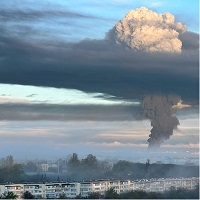 Fuel dump explosion, Crimea
Obviously one can place the various IR theories onto Wilber's AQAL map. Because realists like Mearsheimer are primarily concerned with the exercise of state power, it seems somewhat flatland. It is the constructionist school that at least begins to consider multiple perspectives. An integral analysis would be more comprehensive, considering all quadrants and all levels. Conflict is not just about material gain. It is also about national narratives and the psychology of individual political leaders. Seems straightforward. Except it isn't. The integral community is as prone to the deceptions of ideology and disinformation as anyone. Integral practice requires discipline and vigilance. It is one thing to read about integral theory and quite another to fully absorb and practice it. At the beginning I said that Kohlberg found few people who operated consistently at level 6, the level of universal principles derived via abstract reasoning. This level understands the blinkers of ideology. It changes its mind when presented with new evidence and arguments. It sees through attempts to manipulate the facts to suit a predetermined narrative. It develops the critical skills required to understand the techniques of persuasion, including the history of propaganda as an instrument of war. Perhaps we can call this 'open scepticism' (as opposed to mere cynicism). Every position is provisional and inquisitive. It also demands consistency. A moral principle must be applied universally. No double standards. No hypocrisy. This is not to say individuals at stage 6 reach the same conclusions. They don't. But the principle of open inquiry leads to the mutual good faith exploration of differences with the goal of resolution. It is also scrupulously honest. All philosophical/religious systems place a high priority on truth telling. Thou shalt not bear false witness. Let me expand that principle. Thou shalt not spread disinformation, knowingly or unknowingly. This principle places the onus on the individual to inquire into the veracity of any claim before repeating it, especially if that claim is contested. NOTES
Comment Form is loading comments...
|